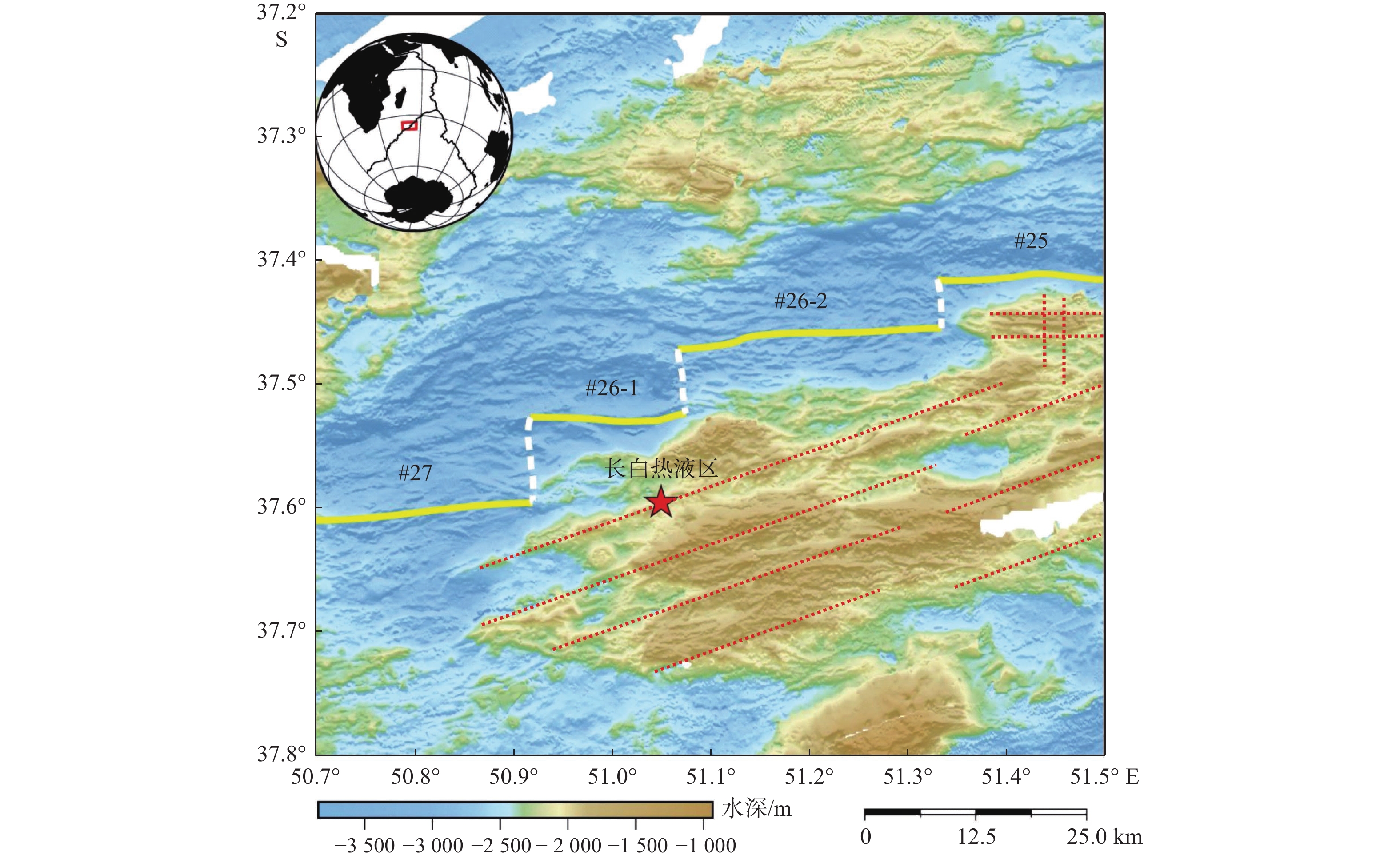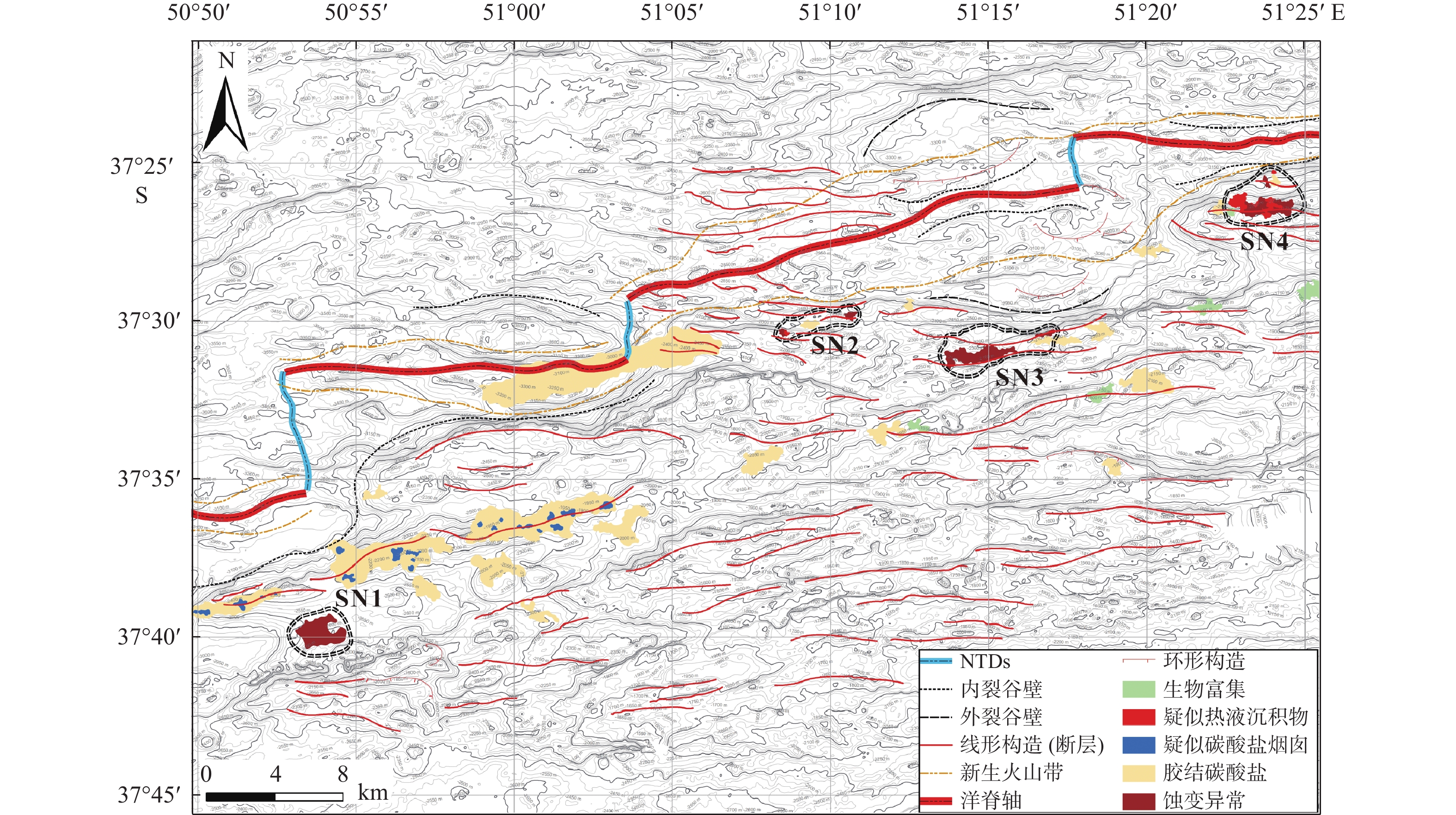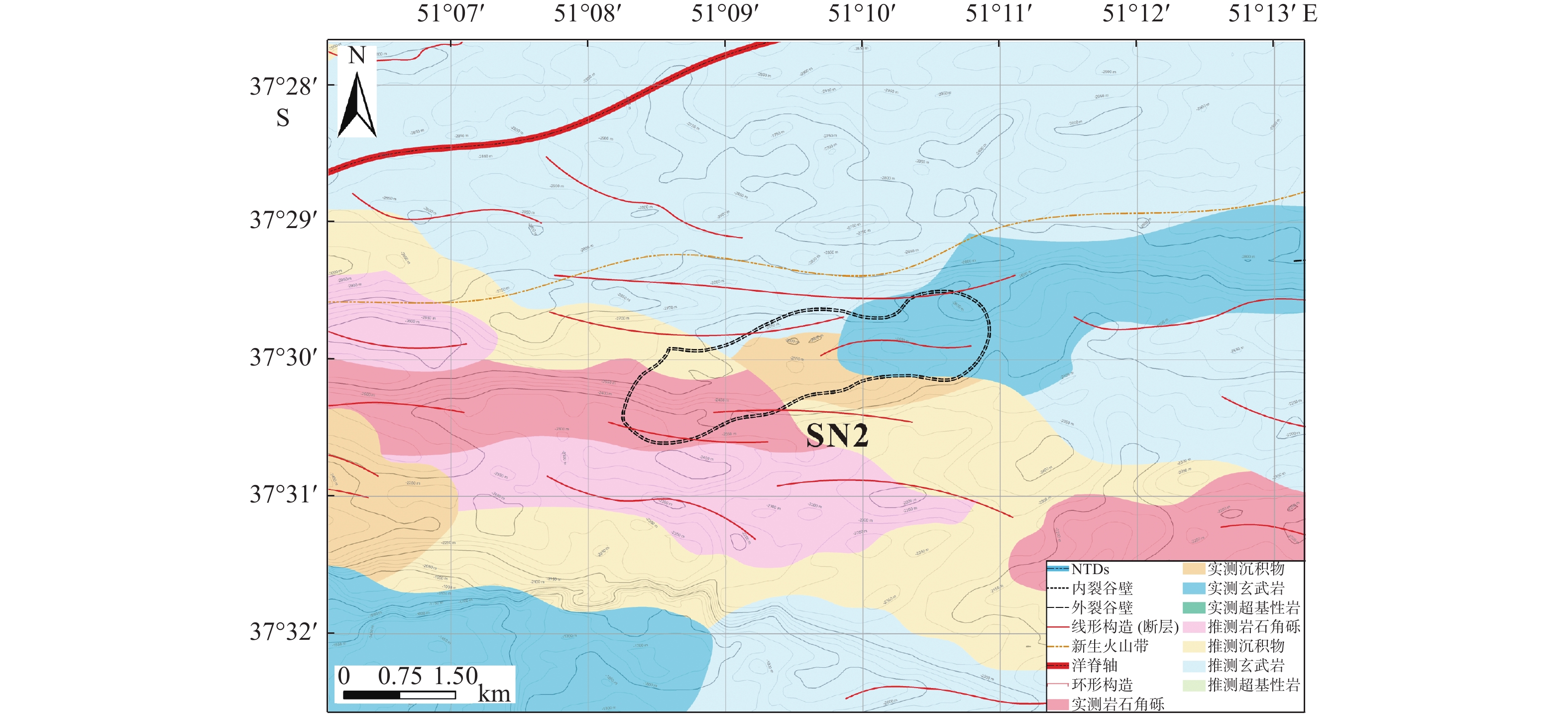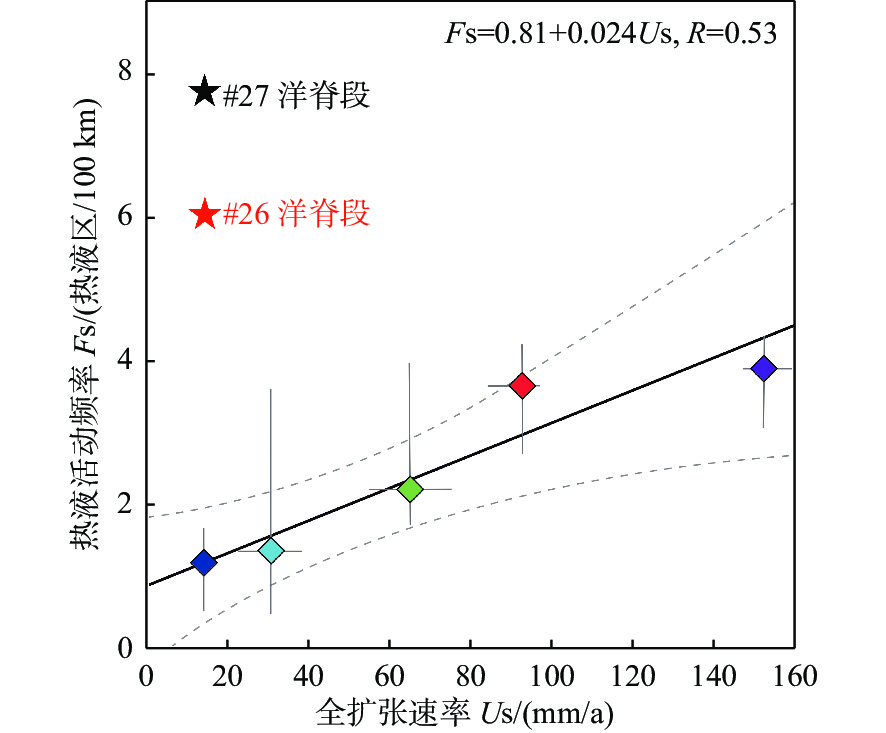Geological characteristics at 51°E (Segment 26) of the Southwest Indian Ridge: implication to submarine hydrothermal activity
-
摘要:
在海底多金属硫化物调查过程中,对于已知热液区需要精细地质填图工作,而这种填图往往存在覆盖面积较小、所包含的地质要素较少以及与区域构造作用和岩浆活动联系不足等问题。基于历年大洋航次在西南印度洋中脊#26洋脊段(51° E区域)所获得的深海光学拖曳系统的资料,结合高精度多波束水深数据,提出一种系统的底质热液异常划分原则,识别出热液蚀变岩石或角砾、疑似热液沉积物、热液生物及其遗骸富集和胶结碳酸盐4种底质热液异常类型。高分辨率海底地质填图结果表明,本区存在4处热液活动的异常区。#26洋脊段热液活动频率值为2~10,至少是全球海底热液活动频率经验公式的1.8倍以上。我们认为在超慢速扩张脊局部熔融异常或者发育非转换不连续带的洋脊段,可能存在更多的海底热液活动,也具有形成大型多金属硫化物矿床的潜力。
Abstract:In the survey of oceanic polymetallic sulphides, detailed geological mapping is needed for a known hydrothermal area, which often covers a small area, contains less geological elements, and is not connected with regional tectonism and magmatism. Based on the data of deep-towed optical system obtained from ocean voyages over the years in the Segment 26 (51°E) of the Southwest Indian Ridge (SWIR), and combined with high-precision multi-beam bathymetric data, we proposed a systematic division principle of substrate hydrothermal anomaly, and identified four types of substrate hydrothermal anomaly: hydrothermal altered rocks or breccia, suspected hydrothermal sediments, hydrothermal organisms and their remains enrichment, and cemented carbonate rocks. The results of high-resolution submarine geological mapping show that there are 4 abnormal areas of hydrothermal activity in Segment 26. The hydrothermal activity occurrence rate of Segment 26 ranged 2~10, which is at least 1.8 times higher of the global one using empirical formula. Therefore, there may be more submarine hydrothermal activities in Segment 26 with melting anomalies or non-transform discontinuities of ultra-slow spreading ridge, and it also has the potential to form large polymetallic sulfide deposits.
-
Key words:
- substrate type /
- hydrothermal anomaly /
- Segment 26 /
- Southwest Indian Ridge
-

-
图 8 全球洋中脊系统热液活动发生率Fs与扩张速率Us关系示意图[5]
Figure 8.
表 1 底质与热液异常的类型及特征
Table 1. Types and characteristics of substrate and hydrothermal anomalies
要素属性 名称 特征描述 底质异常 热液蚀变岩石或角砾 岩石具黄褐色-红褐色蚀变边缘或斑块,破碎程度强 疑似热液沉积物 沉积物呈杂色、夹黄褐色-红褐色;部分站位通过沉积物化探异常确定 热液生物及其遗骸富集 主要为常见的底栖生物群落活动(如珊瑚、藤壶等),也包括已经死亡的各种疑似热液生物遗骸 胶结碳酸盐 固结-半固结沉积物 表 2 热液异常区的分布与特征
Table 2. Distribution and characteristics of hydrothermal anomaly areas
异常区 中心位置 水深范围/m 面积/km2 底质类型 热液异常 SN1 37.66°S,57.89°E 2 350~2 650 6.5 沉积物为主,玄武岩与角砾次之 1处热液蚀变角砾 SN2 37.50°S,51.16°E 1 950~2 650 3.3 角砾为主,沉积物与玄武岩较少,有超基性岩出露 1处疑似热液沉积物,2处热液蚀变角砾 SN3 37.51°S,51.25°E 2 000~2 400 8.5 玄武岩为主,沉积物与角砾次之 2处热液蚀变角砾 SN4 37.44°S,51.40°E 1 750~2 650 约18 角砾为主,沉积物与玄武岩较少,有超基性岩出露 4处疑似热液沉积物,3处热液蚀变角砾 -
[1] BEAULIEU S E, BAKER E T, GERMAN C R, et al. On the global distribution of hydrothermal vent fields: one decade later[C]//Paper presented at the Agu Fall Meeting, 2012.
[2] BEAULIEU S E,BAKER E T,GERMAN C R,et al. Where are the undiscovered hydrothermal vents on oceanic spreading ridges?[J]. Deep-sea Research Part II - Topical Studies in Oceanography,2015,121:202-212. doi: 10.1016/j.dsr2.2015.05.001
[3] GERMAN C R,BAKER E T,MEVEL C A,et al. Hydrothermal activity along the Southwest Indian Ridge[J]. Nature,1998,395(6701):490-493. doi: 10.1038/26730
[4] EDMONDS H N,MICHAEL P J,BAKER E T,et al. Discovery of abundant hydrothermal venting on the ultraslow-spreading Gakkel Ridge in the Arctic Ocean.[J]. Nature,2003,421(6920):252-256. doi: 10.1038/nature01351
[5] GERMAN C R,PETERSER S,HANNINGTON M D. Hydrothermal exploration of mid-ocean ridges:where might the largest sulfide deposits be forming?[J]. Chemical Geology,2016,420(1):114-126.
[6] BAKER E T,CHEN Y J,MORGAN J P. The relationship between near-axis hydrothermal cooling and the spreading rate of mid-ocean ridges[J]. Earth and Planetary Science Letters,1996,142:137-145. doi: 10.1016/0012-821X(96)00097-0
[7] BAKER E T,URABE T. Extensive distribution of hydrothermal plumes along the superfast spreading East Pacific Rise,13°30′–18°40′S[J]. Journal of Geophysical Research,1996,101:8685-8695. doi: 10.1029/95JB03746
[8] HERZIG P M,PLUGER W L. Exploration for hydrothermal activity near the Rodriguez Triple Junction,Indian Ocean[J]. The Canadian Mineralogist,1988,26:721-736.
[9] GAMOA T,NAKAYAMA E,SHITASHIMA K,et al. Hydrothermal plumes at the Rodriguez Triple Junction,Indian Ridge[J]. Earth and Planetary Science Letters,1996,142(1/2):261-270.
[10] GAMOA T,CHIBAB H,YAMANAKAC T,et al. Chemical characteristics of newly discovered black smoker fluids and associated hydrothermal plumes at the Rodriguez Triple Junction,Central Indian Ridge[J]. Earth and Planetary Science Letters,2001,193(3):371-379.
[11] DOVER V C L. Biogeography and ecological setting of Indian Ocean hydrothermal vents[J]. Science,2001,294(5543):818-823. doi: 10.1126/science.1064574
[12] 陶春辉,周建平,李怀明,等. 西南印度洋脊49°39′E热液区硫化物烟囱体的矿物学和地球化学特征及其地质意义[J]. 科学通报,2011,56(28/29):2413-2423.
[13] 陶春辉,李怀明,金肖兵,等. 西南印度洋脊的海底热液活动和硫化物勘探[J]. 科学通报,2014,59(19):1812-1822.
[14] TAO C H,LIN J,GUO S Q,et al. First active hydrothermal vents on an ultraslow-spreading center:Southwest Indian Ridge[J]. Geology,2012,40(1):47-50. doi: 10.1130/G32389.1
[15] BEAULIEU S E,BAKER E T,GERMAN C R,et al. An authoritative global database for active submarine hydrothermal vent fields[J]. Geochemistry Geophysics Geosystems,2013,14(11):4892-4905. doi: 10.1002/2013GC004998
[16] SAUTER D,PATRIAT P,ROMMEVAUX J C,et al. The Southwest Indian Ridge between 49°15'E and 57°E:focused accretion and magma redistribution[J]. Earth and Planetary Science Letters,2001,192(3):303-317. doi: 10.1016/S0012-821X(01)00455-1
[17] LI J B,JIAN H C,CHEN Y J,et al. Seismic observation of an extremely magmatic accretion at the ultraslow spreading Southwest Indian Ridge[J]. Geophysical Research Letters,2015,42(8):2656-2663. doi: 10.1002/2014GL062521
[18] NIU X W,RUAN A G,LI J B,et al. Along-axis variation in crustal thickness at the ultraslow spreading Southwest Indian Ridge (50°E) from a wide-angle seismic experiment[J]. Geochemistry Geophysics Geosystems,2015,16(2):468-485. doi: 10.1002/2014GC005645
[19] JIAN H C,SINGH S C,CHEN Y J,et al. Evidence of an axial magma chamber beneath the ultraslow-spreading Southwest Indian Ridge[J]. Geology,2017,45(2):143-146. doi: 10.1130/G38356.1
[20] ZHANG H T, TAO C H, LI J H. Different crust failure modes controlled by spreading obliquity and its implication: insight from Southwest Indian Ridge 46-52°E[C]//InterRidge Theoretical Institute, 2015.
[21] LIU C,LI J,TAO C H,et al. Variations in faulting style of the Southwest Indian Ridge (46°-53.5°E):implications for crustal accretion process at ultraslow-spreading ridges[J]. Tectonophysics,2020:228552.
[22] 翟世奎,于增慧,杜同军. 冲绳海槽中部现代海底热液活动在沉积物中的元素地球化学记录[J]. 海洋学报,2007,29(1):58-65.
[23] 曹红,曹志敏. 西南印度洋中脊海底热液活动[J]. 海洋地质与第四纪地质,2011,31(1):67-75.
[24] 曾志刚,陈祖兴,张玉祥,等. 海底热液活动的环境与产物[J]. 海洋科学,2020,44(7):143-155.
[25] DEMARTIN B J,SOHN R A,CANALES J P,et al. Kinematics and geometry of active detachment faulting beneath the Trans-Atlantic Geotraverse (TAG) hydrothermal field on the Mid-Atlantic Ridge[J]. Geology,2007,35(8):711-714. doi: 10.1130/G23718A.1
[26] ANDERSEN C, RUPKE L, GREVEMEYER I, et al. Conditions for high-temperature off-axis venting at the Lgatchev 1 hydrothermal field[C]//EGU General Assembly, 2013.
[27] YU J Y,TAO C H,LIAO S L,et al. Resource estimation of the sulfide-rich deposits of the Yuhuang-1 hydrothermal field on the ultraslow-spreading Southwest Indian Ridge[J]. Ore Geology Reviews,2021,134(7):104169.
[28] LORETO M F,Doan D D,UNER S,et al. Fault-controlled deep hydrothermal flow in a back-arc tectonic setting,SE Tyrrhenian Sea[J]. Scientific Reports,2019,9:17724. doi: 10.1038/s41598-019-53696-z
[29] STIX J,KENNEDY B,HANNINGTON M,et al. Caldera-forming processes and the origin of submarine volcanogenic massive sulfide deposits[J]. Geology,2003,31(4):375. doi: 10.1130/0091-7613(2003)031<0375:CFPATO>2.0.CO;2
[30] EMBLEY R W,DE RONDE C E J,MERLE S G,et al. Detailed morphology and structure of an active submarine arc caldera:Brothers volcano,Kermadec arc[J]. Economic Geology,2012,107(8):1557-1570. doi: 10.2113/econgeo.107.8.1557
[31] STANDISH J J,SIMS K W W. Young off-axis volcanism along the ultraslow-spreading Southwest Indian Ridge[J]. Nature Geoscience,2010,3(4):286-292. doi: 10.1038/ngeo824
[32] TAO C H,SEYFRIED W E,LOWELL R P,et al. Deep high-temperature hydrothermal circulation in a detachment faulting system on the ultra-slow spreading ridge[J]. Nature Communications,2020,11:1300. doi: 10.1038/s41467-020-15062-w
[33] CAROSI R,MONTOMOLI C,IACCARINO S. 20 years of geological mapping of the metamorphic core across Central and Eastern Himalayas[J]. Earth-Science Reviews,2018,177:124-138. doi: 10.1016/j.earscirev.2017.11.006
[34] 张涛,JIAN L,高金耀. 西南印度洋中脊热液区的岩浆活动与构造特征[J]. 中国科学:地球科学,2013,43(11):1834-1846.
[35] TUCHOLKE B E,BEHN M D,BUCK W R,et al. Role of melt supply in oceanic detachment faulting and formation of megamullions[J]. Geology,2008,36(6):455-458. doi: 10.1130/G24639A.1
[36] MCCAIG A M,CLIFF R A,ESCARTIN J,et al. Oceanic detachment faults focus very large volumes of black smoker fluids[J]. Geology,2007,35(10):935-938. doi: 10.1130/G23657A.1
[37] SMITH D K,CANN J R,ESCARTIN J,et al. Widespread active detachment faulting and core complex formation near 13° N on the Mid-Atlantic Ridge[J]. Nature,2006,442(7101):440-443. doi: 10.1038/nature04950
[38] 周鹏, 韩喜球, 王叶剑, 等. 拆离断层对海底热液硫化物形成的制约: 来自岩石学和近底观测的证据[C]. 中国矿物岩石地球化学学会第17届学术年会论文摘要集. 2019.
[39] KLISCHIES M,PETERSEN S,DEVEY C W,et al. Geological mapping of the Menez Gwen segment at 37°50′N on the Mid-Atlantic Ridge:implications for accretion mechanisms and associated hydrothermal activity at slow-spreading mid-ocean ridges[J]. Marine Geology,2019,412:107-122. doi: 10.1016/j.margeo.2019.03.012
[40] 栾锡武. 现代海底热液活动[M]. 北京: 科学出版社, 2017.
[41] YUE X H,LI H M,REN J Y,et al. Seafloor hydrothermal activity along mid-ocean ridge with strong melt supply:study from Segment 27,Southwest Indian Ridge[J]. Scientific Reports,2019,9:1-10. doi: 10.1038/s41598-018-37186-2
-




 下载:
下载:






